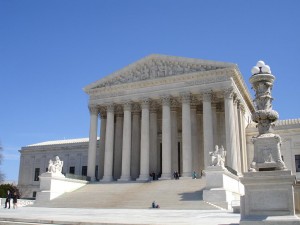The Supreme Court issued six opinions today. Read more about the decisions below.
Fisher v. Univ. of Texas at Austin
Docket: 11-345
Date: June 24, 2013
Read commentary & review related lower court decisions here.
 Justia Summary: Since the Court’s 2003 decision, Grutter v. Bollinger, the University of Texas at Austin has considered race as a factor in undergraduate admissions. A Caucasian, rejected for admission, sued, alleging that consideration of race in admissions violated the Equal Protection Clause. The district court granted summary judgment to the University. The Fifth Circuit affirmed. The Supreme Court vacated and remanded, reasoning that the Fifth Circuit did not hold the University to the demanding burden of strict scrutiny articulated in Supreme Court precedent. A university must clearly demonstrate that its purpose or interest is constitutionally permissible and substantial, and that its use of the classification is necessary to the accomplishment of its purpose, and “that the reasons for any [racial] classification [are] clearly identified and unquestionably legitimate.” A court may give some deference to a university’s judgment that diversity is essential to its educational mission, if diversity is not defined as mere racial balancing and there is a reasoned, principled explanation for the academic decision. The University must prove that the means it chose to attain diversity are narrowly tailored to its goal and that admissions processes “ensure that each applicant is evaluated as an individual and not in a way that makes an applicant’s race or ethnicity the defining feature of his or her application.” A reviewing court must ultimately be satisfied that no workable race-neutral alternative would produce the educational benefits of diversity. The Fifth Circuit simply presumed that the school acted in good faith and gave the plaintiff the burden of rebutting that presumption. Strict scrutiny does not permit a court to accept a school’s assertion that its admissions process uses race in a permissible way without closely examining how the process works in practice. On remand, the Fifth Circuit must assess whether the University has offered sufficient evidence to prove that its admissions program is narrowly tailored to obtain the educational benefits of diversity.
Justia Summary: Since the Court’s 2003 decision, Grutter v. Bollinger, the University of Texas at Austin has considered race as a factor in undergraduate admissions. A Caucasian, rejected for admission, sued, alleging that consideration of race in admissions violated the Equal Protection Clause. The district court granted summary judgment to the University. The Fifth Circuit affirmed. The Supreme Court vacated and remanded, reasoning that the Fifth Circuit did not hold the University to the demanding burden of strict scrutiny articulated in Supreme Court precedent. A university must clearly demonstrate that its purpose or interest is constitutionally permissible and substantial, and that its use of the classification is necessary to the accomplishment of its purpose, and “that the reasons for any [racial] classification [are] clearly identified and unquestionably legitimate.” A court may give some deference to a university’s judgment that diversity is essential to its educational mission, if diversity is not defined as mere racial balancing and there is a reasoned, principled explanation for the academic decision. The University must prove that the means it chose to attain diversity are narrowly tailored to its goal and that admissions processes “ensure that each applicant is evaluated as an individual and not in a way that makes an applicant’s race or ethnicity the defining feature of his or her application.” A reviewing court must ultimately be satisfied that no workable race-neutral alternative would produce the educational benefits of diversity. The Fifth Circuit simply presumed that the school acted in good faith and gave the plaintiff the burden of rebutting that presumption. Strict scrutiny does not permit a court to accept a school’s assertion that its admissions process uses race in a permissible way without closely examining how the process works in practice. On remand, the Fifth Circuit must assess whether the University has offered sufficient evidence to prove that its admissions program is narrowly tailored to obtain the educational benefits of diversity.

 The media has been closely following the criminal trial of George Zimmerman, the racially charged trial in which Zimmerman is accused of murdering teenager Trayvon Martin. Just this week, a jury of six was chosen.
The media has been closely following the criminal trial of George Zimmerman, the racially charged trial in which Zimmerman is accused of murdering teenager Trayvon Martin. Just this week, a jury of six was chosen. An agreement between American Express and merchants who accept American Express cards, requires that all of their disputes be resolved by arbitration and provides that there “shall be no right or authority for any Claims to be arbitrated on a class action basis.” The merchants filed a class action, claiming that American Express violated section 1 of the Sherman Act and seeking treble damages under section 4 of the Clayton Act. The district court dismissed. The Second Circuit reversed, holding that the class action waiver was unenforceable and that arbitration could not proceed because of prohibitive costs. The Circuit upheld its reversal on remand in light of a Supreme Court holding that a party may not be compelled to submit to class arbitration absent an agreement to do so.
An agreement between American Express and merchants who accept American Express cards, requires that all of their disputes be resolved by arbitration and provides that there “shall be no right or authority for any Claims to be arbitrated on a class action basis.” The merchants filed a class action, claiming that American Express violated section 1 of the Sherman Act and seeking treble damages under section 4 of the Clayton Act. The district court dismissed. The Second Circuit reversed, holding that the class action waiver was unenforceable and that arbitration could not proceed because of prohibitive costs. The Circuit upheld its reversal on remand in light of a Supreme Court holding that a party may not be compelled to submit to class arbitration absent an agreement to do so. Alleyne was convicted using or carrying a firearm in relation to a crime of violence, 18 U.S.C. 924(c)(1)(A), which carries a five-year mandatory minimum sentence. The sentences increases to a seven-year minimum if the firearm is brandished, 924(c)(1)(A)(ii), and to a 10-year minimum if it is discharged, 924(c)(1)(A)(iii). The jury form indicated that Alleyne had “[u]sed or carried a firearm during and in relation to a crime of violence,” but not that the firearm was “[b]randished.” Alleyne objected to a sentencing report recommendation of a seven-year term, arguing that the jury did not find brandishing beyond a reasonable doubt and that raising his mandatory minimum sentence based on a judge’s finding of brandishing would violate his Sixth Amendment right to a jury trial. The district court overruled the objection. The Fourth Circuit affirmed.
Alleyne was convicted using or carrying a firearm in relation to a crime of violence, 18 U.S.C. 924(c)(1)(A), which carries a five-year mandatory minimum sentence. The sentences increases to a seven-year minimum if the firearm is brandished, 924(c)(1)(A)(ii), and to a 10-year minimum if it is discharged, 924(c)(1)(A)(iii). The jury form indicated that Alleyne had “[u]sed or carried a firearm during and in relation to a crime of violence,” but not that the firearm was “[b]randished.” Alleyne objected to a sentencing report recommendation of a seven-year term, arguing that the jury did not find brandishing beyond a reasonable doubt and that raising his mandatory minimum sentence based on a judge’s finding of brandishing would violate his Sixth Amendment right to a jury trial. The district court overruled the objection. The Fourth Circuit affirmed. Myriad obtained patents after discovering the precise location and sequence of the BRCA1 and BRCA2 genes, mutations of which can dramatically increase the risk of breast and ovarian cancer. The discovery enabled Myriad to develop medical tests for detecting mutations for assessing cancer risk. Myriad’s patents would give it the exclusive rights to isolate an individual’s BRCA1 and BRCA2 genes and to synthetically create BRCA composite DNA. The district court entered summary judgment, finding the patents invalid under 35 U.S.C. 101 because they covered products of nature. On remand following the Supreme Court’s decision, Mayo Collaborative Servs. v. Prometheus Labs, Inc., the Federal Circuit found both isolated DNA and composite DNA patent-eligible. The Supreme Court affirmed in part and reversed in part, noting that the case did not involve “method claims” for new applications of knowledge about the genes or the patentability of DNA in which the order of the naturally occurring nucleotides has been altered. A naturally-occurring DNA segment is not patent-eligible merely because it has been isolated, but composite DNA is patent-eligible because it is not naturally-occurring. Myriad did not create or alter the genetic information encoded in the genes or the genetic structure of the DNA. Even brilliant discovery does not alone satisfy the section 101 inquiry. Myriad’s claims are not saved by the fact that isolating DNA from the human genome severs chemical bonds that bind gene molecules together. The claims are not expressed in terms of chemical composition, nor do they rely on the chemical changes resulting from the isolation of a particular DNA section. Composite DNA, however, is not a “product of nature;” a lab technician unquestionably creates something new when introns are removed from a DNA sequence to make composite DNA.
Myriad obtained patents after discovering the precise location and sequence of the BRCA1 and BRCA2 genes, mutations of which can dramatically increase the risk of breast and ovarian cancer. The discovery enabled Myriad to develop medical tests for detecting mutations for assessing cancer risk. Myriad’s patents would give it the exclusive rights to isolate an individual’s BRCA1 and BRCA2 genes and to synthetically create BRCA composite DNA. The district court entered summary judgment, finding the patents invalid under 35 U.S.C. 101 because they covered products of nature. On remand following the Supreme Court’s decision, Mayo Collaborative Servs. v. Prometheus Labs, Inc., the Federal Circuit found both isolated DNA and composite DNA patent-eligible. The Supreme Court affirmed in part and reversed in part, noting that the case did not involve “method claims” for new applications of knowledge about the genes or the patentability of DNA in which the order of the naturally occurring nucleotides has been altered. A naturally-occurring DNA segment is not patent-eligible merely because it has been isolated, but composite DNA is patent-eligible because it is not naturally-occurring. Myriad did not create or alter the genetic information encoded in the genes or the genetic structure of the DNA. Even brilliant discovery does not alone satisfy the section 101 inquiry. Myriad’s claims are not saved by the fact that isolating DNA from the human genome severs chemical bonds that bind gene molecules together. The claims are not expressed in terms of chemical composition, nor do they rely on the chemical changes resulting from the isolation of a particular DNA section. Composite DNA, however, is not a “product of nature;” a lab technician unquestionably creates something new when introns are removed from a DNA sequence to make composite DNA. A lawsuit filed in the U.S. District Court for the District of Wyoming alleged that the plane of Amelia Earhart had been located. Plaintiff Timothy Mellon stated in his
A lawsuit filed in the U.S. District Court for the District of Wyoming alleged that the plane of Amelia Earhart had been located. Plaintiff Timothy Mellon stated in his  Maryland v King
Maryland v King Back in January, key provisions of FISA – the Foreign Intelligence Surveillance Act – were renewed by Congress. I wrote about the troubling situation of
Back in January, key provisions of FISA – the Foreign Intelligence Surveillance Act – were renewed by Congress. I wrote about the troubling situation of  California is proposing to charge citizens to access and read court files and other public documents. The Administrative Office of the Courts has proposed that the state charge $10 for every name, file, or information that comes back from a search.
California is proposing to charge citizens to access and read court files and other public documents. The Administrative Office of the Courts has proposed that the state charge $10 for every name, file, or information that comes back from a search.